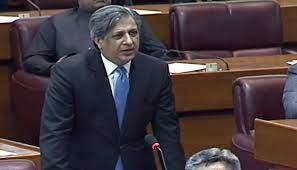ISLAMABAD - The National Assembly yesterday adopted an unusual resolution which deems the judiciary’s “unreasonable interference in political matters as the cause of political instability”.
The resolution, moved by Information Minister Maryam Aurangzeb, supported the stance of the four dissenting judges in the supreme court’s March 1 order regarding Khyber Pakhtunkhwa and Punjab assemblies elections. It demanded its implementation and expected that the higher judiciary would refrain from interfering in political and administrative matters.
The unanimously approved resolution also states that the top electoral body (ECP) was an independent institution which was obligated to hold fair and free elections and its constitutional role should not be interfered in.
About holding separate elections in the two provinces, the resolution said that the polls for all assemblies should take place at the same time under caretaker governments to ensure actual political stability. It said that matters requiring collective wisdom should be listened to by a full court bench of the Supreme Court.
Later, Law Minister Azam Nazeer Tarar tabled the Supreme Court (Practice and Procedure) Bill, 2023, apparently in a bid to limit the discretionary powers to take suo motu notice by Pakistan's top judge.
The development came a day after two Supreme Court judges - Justice Syed Mansoor Ali Shah and Justice Jamal Khan Mandokhail - raised questions over the powers of the CJP, saying the apex court “cannot be dependent on the solitary decision of one man, the Chief Justice”.
In his speech on the floor of the house during the NA session, Prime Minister Shehbaz Sharif also sought parliamentary action in this regard, terming the dissenting note “a ray of hope”.
Later, Speaker National Assembly Raja Pervez Ashraf, on the request of lawmakers, referred the bill to the concerned committee with the instructions to quickly discuss its clauses. The bill is aimed to provide any matter invoking exercise of original jurisdiction in case of suo moto notice under clause 3 of Article 184 of the Constitution will be first placed before a committee comprising Chief Justice of Pakistan and two other senior most Judges of the Supreme Court in order of seniority. The bill, containing five clauses moved by Minister for Law Azam Nazir Tarar, was also approved by the federal cabinet.
The law minister, sharing the salient features of the bill, said that the Section-2 of the bill regarding constitution of benches says that every cause, appeal, or matter before the Supreme Court shall be heard and disposed of by a bench constituted by the committee comprising Chief Justice of Pakistan and two senior most judges, in order of seniority. About Section-3 of the bill, he says that any matter invoking exercise of original jurisdiction under Article 184 (3) of the Constitution shall be first placed before the Committee constituted under section 2 for examination and if the committee is of the view that a question of public importance with reference to enforcement of any of the fundamental rights conferred by Constitution is involved, it shall constitute a bench comprising not less than three judges of the Supreme Court of Pakistan which may also include the members of the committee for adjudication of the matter.






